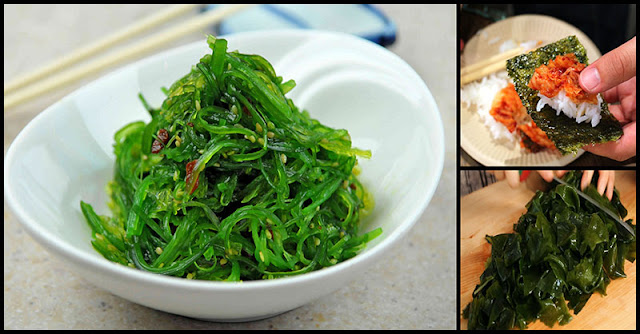Are you familiar with seaweeds? Have you ever wondered about its health benefits? Seaweeds are packed with serious nutritional punch and incredibly rich in vitamins, minerals, and antioxidants.
What Is A Seaweed?
Seaweeds, or algae, belongs to a group of plant-like organisms that grow in the sea. In many traditional cultures, seaweeds are used in herbal medicines as well as part of a healthy diet.
The group of seaweeds that are commonly consumed is:
- Blue-green algae such as spirulina and chlorella
- Green algae such as sea lettuce or Ulva, and sea grapes
- Red algae such as dulse, laver, and nori (the sushi seaweed)
- Brown algae such as kombu, arame, kelp, and wakame (the miso soup seaweed)
Benefits Of Eating Seaweeds
DHA and EPA Omega-3 Fatty Acids
Seaweed contains preformed omega-3 fatty acids DHA and EPA, thus making it a reliable source of omega-3 for vegetarians.
Vitamins And Minerals
Compared to any land vegetables, seaweed is much more nutrient-dense. It is an excellent source of micronutrients such as zinc, magnesium, selenium, iron, calcium, and folate. Seaweed is also a great source of iodine.
Antioxidants
Seaweeds are packed with antioxidants. It can protect against oxidative stress and prevent chronic diseases like cancer and digestive problems.
Fiber And Prebiotics
All plants contain fiber. However, seaweed has other odd types of carbohydrates that we lack the digestive enzymes to digest. These include galactan, carrageenan, fucan, and many more – which then become foods for the bacteria.
The bacteria that dominate in your gut is directly influenced by the food you eat. The bacteria will grow better when feed best on the foods you choose to eat. This is the reason why some cultures handle different types of food better than others. Actually, scientists found that the gut bacteria in healthy Japanese people are higher in bacteria that can digest the types of carbohydrates in seaweeds.
Aids In Digestion
For many people, beans can cause gas and upset the stomach. This can be fixed by adding kombu, a particular kind of seaweed, to the beans when cooking.
Potential Risks From Eating Seaweed
Digestive Problems From Seaweed Carbohydrates And Fibers
Found in seaweeds are different types of carbohydrates that your digestive system can’t digest. These carbohydrates are passed down to your gut bacteria. For those people with small intestinal bacterial overgrowth or prone to digestive problems, these carbohydrates (such as agar and carrageenan) cause significant issues like inflammation both in the gut and throughout the human body.
Too Much Iodine Can Cause Thyroid Problems
Seaweed is a great source of iodine, which is a very important mineral for thyroid functions. Though the thyroid can adjust to higher intakes of iodine, there’s a possibility of developing thyroid problems from too much iodine.
In a Japanese study, it was revealed that women who regularly consume 15-30 grams of kombu have reduced free T3 and T4; and elevated TSH. But when they stopped consuming seaweed, their TSH and thyroid hormone levels returned to normal.
How To Cook And Eat Seaweed
Seaweeds are very versatile. Here are a few different ways to enjoy them:
- Soups – Seaweed tastes delicious in bone broth, which makes it seaweed soup.
- Salads – Most types of seaweed can be made into a Japanese-style salad with garlic, ginger, vinegar, and sesame oil.
- Sprinkled on other foods – Seaweed flakes can be sprinkled on soups, rice, salads, or any other dishes.
- Snacking out of a bag – Nori and dulse can just be eaten out of a bag.









